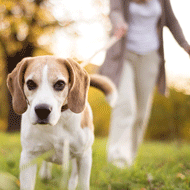Welfare groups create guidelines for dog walkers

“We felt it was extremely important - not only for the welfare of dogs but also for dog walkers themselves - to produce a set of guidelines."
A set of guidelines have been created to help ensure high welfare standards in the unregulated dog walking profession.
The Dogs Trust, RSPCA and Pet Industry Federation joined forces to produce the Professional Dog Walkers’ Guidelines, as recent research shows there is a growing demand for this service.
A survey by the Dogs Trust found 13 per cent of owners rely on dog walkers to ensure their pet gets enough exercise. Yet nearly 60 per cent do not have a contract or legal agreement with their dog walker.
Only a small number of local authorities have introduced regulations for local dog walkers and animal welfare groups say the quality of service is a ‘postcode lottery’ as a result.
Dog welfare expert Dr Sam Gaines explains: “Dog walkers are currently unregulated and unlicensed meaning there are no checks on who these people are and how they ensure the needs of the dogs in their care are being met.
“We felt it was extremely important - not only for the welfare of dogs but also for dog walkers themselves - to produce a set of guidelines to ensure that dogs are always being well looked after and to guarantee that dog walkers know what is expected of them.
“We hope these new guidelines will also help dog owners make informed decisions when choosing the right dog walker for them and their pet.”
The guidelines aim to provide information to local authorities and a framework for dog walkers, as well as helping pet owners understand what they should expect from a dog walker.



 The Veterinary Medicines Directorate (VMD) is inviting applications from veterinary students to attend a one-week extramural studies (EMS) placement in July 2026.
The Veterinary Medicines Directorate (VMD) is inviting applications from veterinary students to attend a one-week extramural studies (EMS) placement in July 2026.